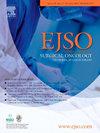A deep-learning model to predict the completeness of cytoreductive surgery in colorectal cancer with peritoneal metastasis☆
IF 3.5
2区 医学
Q2 ONCOLOGY
引用次数: 0
Abstract
Background
Colorectal cancer (CRC) with peritoneal metastasis (PM) is associated with poor prognosis. The Peritoneal Cancer Index (PCI) is used to evaluate the extent of PM and to select Cytoreductive Surgery (CRS). However, PCI score is not accurate to guide patient's selection for CRS.
Objective
We have developed a novel AI framework of decoupling feature alignment and fusion (DeAF) by deep learning to aid selection of PM patients and predict surgical completeness of CRS.
Methods
186 CRC patients with PM recruited from four tertiary hospitals were enrolled. In the training cohort, deep learning was used to train the DeAF model using Simsiam algorithms by contrast CT images and then fuse clinicopathological parameters to increase performance. The accuracy, sensitivity, specificity, and AUC by ROC were evaluated both in the internal validation cohort and three external cohorts.
Results
The DeAF model demonstrated a robust accuracy to predict the completeness of CRS with AUC of 0.9 (95 % CI: 0.793–1.000) in internal validation cohort. The model can guide selection of suitable patients and predict potential benefits from CRS. The high predictive performance in predicting CRS completeness were validated in three external cohorts with AUC values of 0.906(95 % CI: 0.812–1.000), 0.960(95 % CI: 0.885–1.000), and 0.933 (95 % CI: 0.791–1.000), respectively.
Conclusion
The novel DeAF framework can aid surgeons to select suitable PM patients for CRS and predict the completeness of CRS. The model can change surgical decision-making and provide potential benefits for PM patients.
一种预测结直肠癌伴腹膜转移的细胞减少手术完整性的深度学习模型
结直肠癌(CRC)伴腹膜转移(PM)与不良预后相关。腹膜癌指数(PCI)用于评估PM的程度并选择细胞减少手术(CRS)。然而,PCI评分并不能准确指导患者选择CRS。目的通过深度学习开发一种新的解耦特征对齐和融合(DeAF)人工智能框架,以帮助选择PM患者并预测CRS手术的完全性。方法选取4所三级医院的186例结直肠癌PM患者。在训练队列中,使用深度学习方法通过对比CT图像,使用Simsiam算法训练聋人模型,然后融合临床病理参数以提高性能。在内部验证队列和三个外部队列中评估ROC的准确性、敏感性、特异性和AUC。结果在内部验证队列中,DeAF模型预测CRS完整性的AUC为0.9 (95% CI: 0.793-1.000)。该模型可以指导选择合适的患者,并预测CRS的潜在收益。在三个外部队列中,AUC值分别为0.906(95% CI: 0.812-1.000)、0.960(95% CI: 0.885-1.000)和0.933 (95% CI: 0.791-1.000),验证了预测CRS完整性的高预测性能。结论新的聋人框架可以帮助外科医生选择合适的PM患者进行CRS,并预测CRS的完整性。该模型可以改变手术决策,为PM患者提供潜在的益处。
本文章由计算机程序翻译,如有差异,请以英文原文为准。
求助全文
约1分钟内获得全文
求助全文
来源期刊

Ejso
医学-外科
CiteScore
6.40
自引率
2.60%
发文量
1148
审稿时长
41 days
期刊介绍:
JSO - European Journal of Surgical Oncology ("the Journal of Cancer Surgery") is the Official Journal of the European Society of Surgical Oncology and BASO ~ the Association for Cancer Surgery.
The EJSO aims to advance surgical oncology research and practice through the publication of original research articles, review articles, editorials, debates and correspondence.
 求助内容:
求助内容: 应助结果提醒方式:
应助结果提醒方式:


